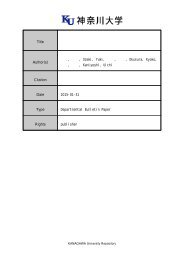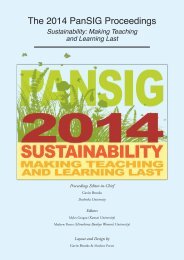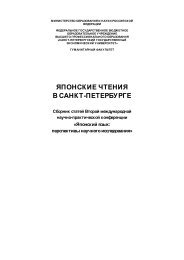to Learners with Special Educational Needs
e-textbook SEN
e-textbook SEN
You also want an ePaper? Increase the reach of your titles
YUMPU automatically turns print PDFs into web optimized ePapers that Google loves.
Pokrivčáková, S. et al. (2015). Teaching Foreign Languages <strong>to</strong> <strong>Learners</strong> <strong>with</strong> <strong>Special</strong> <strong>Educational</strong> <strong>Needs</strong>:<br />
e-textbook for foreign language teachers. Nitra: Constantine the Philosopher University. 128 p.<br />
ISBN 978-80-558-0941-0<br />
Type of school<br />
Number of learners coming from socially<br />
disadvantaged environment in 2014<br />
nursery schools 4324<br />
primary schools 20,785<br />
grammar schools 388<br />
conserva<strong>to</strong>ries 0<br />
secondary vocational schools 1932<br />
<strong>to</strong>tal 27429<br />
Tab. 5: Number of learners coming from socially disadvantaged environment in 2014<br />
C. Inclusion<br />
In accordance <strong>with</strong> the School Act 245/2008 all learners <strong>with</strong> special needs, whose learning<br />
performances and outcomes are not seriously affected and who do not require special attention<br />
of special educa<strong>to</strong>rs/assistants, should be included in<strong>to</strong> regular classes. It means that learners<br />
<strong>with</strong> SEN are involved in regular school activities during the whole school day. During the entire<br />
time, they are taught by mainstream teachers alongside mainstream learners, which brings<br />
important social consequences for the future life of all the subjects involved, since the<br />
experience usually has an enriching effect on both learners <strong>with</strong> SEN and mainstream learners.<br />
This type of organization relies heavily on the expertise of the teacher who must be skilled <strong>to</strong><br />
differentiate the learning objectives and manage mixed-ability group activities, based on<br />
solidarity and as team work (for more see Ainscow, 2006; Bernard, 2000; Stubbs, 2002 and<br />
others).<br />
Professional support for teachers<br />
Slovak foreign language teachers are provided <strong>with</strong> several types of professional support<br />
while dealing <strong>with</strong> learners <strong>with</strong> SEN: institutional (ECC, MPC, universities), specialized teachertraining<br />
courses, conferences, specialized publications and other sources.<br />
Centres of Pedagogical and Psychological Consultancy and Prevention (Centrá<br />
pedagogicko-psychologického poradenstva a prevencie) provide complex psychological,<br />
special-pedagogical and diagnostic consultancy <strong>to</strong> both schools/teachers and parents. CPPC´s<br />
services are free of charge for both. Regarding learners <strong>with</strong> SEN, they are responsible for<br />
diagnosing the learners and working out their individual educational plans. Moreover, they<br />
furnish schools/teachers <strong>with</strong> methodological instructions, special teaching materials and<br />
compensation aids if necessary.<br />
Teachers, school managers and parents can also consult the special needs<br />
counselling/resource centres (centrá špeciálno-pedagogického poradenstva) which focus on<br />
searching for and diagnosing learners <strong>with</strong> various disabilities or disorders. Moreover, they<br />
assess the prognosis of learner´ progress and recommend the optimal form of<br />
intervention/education.<br />
In addition, teachers may ask for help school special pedagogues, school special<br />
psychologists, or educational consultants.<br />
Training teachers for teaching SEN learners<br />
Methodological and Pedagogical Centres (MPC) are, in accord <strong>with</strong> Law 596/2003, the<br />
organizations under direct management of the Ministry of Education. They focus on in-service<br />
teacher’s training and life-long education. So far, no courses have been organized <strong>to</strong> train foreign<br />
language teachers how <strong>to</strong> perform foreign language teaching <strong>to</strong> learners <strong>with</strong> SEN.<br />
In Slovakia, there are 8 universities which have the accredited right <strong>to</strong> organize pre-service<br />
and in-service teacher training for foreign language teachers. Only a few of them (i.e.<br />
Constantine the Philosopher University in Nitra, University of Matej Bel in Banská Bystrica,<br />
Prešov University and the Catholic University in Ružomberok) provide their students <strong>with</strong><br />
12






